|
Empire of Evil
by Peter Lorden
10 May 2005
[From Instauration, August 1998]
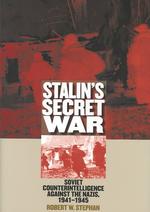 Nikolai Tolstoy's Stalin's Secret War[1] leaves no room for doubt about the real nature of the Soviet Union. For the sheer magnitude of its crimes against humanity, nothing in history can match it. Despite all the talk of universal brotherhood, the Soviet hierarchy lived like prosperous gangsters. Kremlin officials behaved, said a foreign diplomat, more like an occupying power than a legitimate government. Hence the need for a huge and ruthless force of secret police. Always in fear of the masses they ruled, Bolshevik leaders made a prison of their entire domain, the "Gulag Archipelago"[2] its fearsome symbol. Solzhenitsyn tells us that some 60 million people died in the horrific slave-camp system from 1918 to 1956.
Nikolai Tolstoy's Stalin's Secret War[1] leaves no room for doubt about the real nature of the Soviet Union. For the sheer magnitude of its crimes against humanity, nothing in history can match it. Despite all the talk of universal brotherhood, the Soviet hierarchy lived like prosperous gangsters. Kremlin officials behaved, said a foreign diplomat, more like an occupying power than a legitimate government. Hence the need for a huge and ruthless force of secret police. Always in fear of the masses they ruled, Bolshevik leaders made a prison of their entire domain, the "Gulag Archipelago"[2] its fearsome symbol. Solzhenitsyn tells us that some 60 million people died in the horrific slave-camp system from 1918 to 1956.
Former Israeli Prime Minister Menahem Begin briefly fell into the Gulag in 1940. A Zionist wishing to present Jewish suffering under Hitler as having been unique in human history, he tells us in White Nights[3] that Nazi camps cannot be compared to those of the Gulag. Why not, when 3 million died in Kolyma and 2 million in Vorkuta, to name but two of Stalin's worst. Some 7,000 slaves whose task was finished were driven onto a mined cliff and blown up. Other victims were sunk in barges or frozen to death in transit or used as human mine detectors. A trainload of prisoners wree simply burned alive when the train couldn't be moved before the German advance.
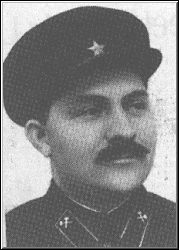 Why was the International Red Cross allowed access to Hitler's camps throughout the war, but never to Stalin's? As to Begin's suggestion that the former offered only a quick death and the latter maybe a slow one, Germany has paid compensation to over 4 million Holocaust survivors, most of them Jewish. Gulag survivors got nothing but a criminal record. Begin's prejudice, however, is evident in his failure, when listing Stalin's chief accomplices, to make any mention of Lazar Kaganovich [right], the most powerful Jew in the Soviet Union. His story is told by Stuart Kahan in The Wolf of the Kremlin.[4] For many years second only to Stalin, he was a clever organizer of titanic energy who was widely held responsible for 20 million deaths.
Why was the International Red Cross allowed access to Hitler's camps throughout the war, but never to Stalin's? As to Begin's suggestion that the former offered only a quick death and the latter maybe a slow one, Germany has paid compensation to over 4 million Holocaust survivors, most of them Jewish. Gulag survivors got nothing but a criminal record. Begin's prejudice, however, is evident in his failure, when listing Stalin's chief accomplices, to make any mention of Lazar Kaganovich [right], the most powerful Jew in the Soviet Union. His story is told by Stuart Kahan in The Wolf of the Kremlin.[4] For many years second only to Stalin, he was a clever organizer of titanic energy who was widely held responsible for 20 million deaths.
For institutionalized sadism and the systematic dehumanization of its victims, nothing came close to the Gulag until Hitler started acting like a Bolshevik. Der Führer wrote, "There is more that binds us to Bolshevism than separates us from it." His Chief Prosecutor, Roland Freisler (whom he called "our Vyshinsky"), had himself been a Bolshevik commissar in the Ukraine. This illustrates how each system was happy to recruit from the other.
Even a motto of Hitler's camps -- Hier ist kein Warum -- eerily echoed the spirit of the Gulag. Were not the crematoria of Auschwitz-Birkenau rivaled by the smoking chimneys of the dreaded Lubyanka hellhole in Moscow -- "the prison of no return?" The rhetoric of Aryan superiority or Marxist-Leninism was merely a cloak for th enaked ambition towards absolute power. Each dictator admired the other for his ruthlessness. Thus Hitler stated in 1942: "Stalin must command our unconditional respect. He's a hell of a fellow -- half-beast, half-giant." Stalin's adviser on German affairs, Karl Radek, said in 1934 he had seen "no reason why fascist Germany and the Soviet Union should not get on together." He saw the Nazi Brownshirts as "a wonderful reserve of future Communists."
The two tyrannies did get on together for a while. They were on the same side when WWII began. Short of actually fighting, Stalin helped Hitler in every way he could -- from sharing intelligence to shipping vast quantities of strategic materials to bypass the Allied embargo. He even allowed German U-boats the use of Russian bases to harass the Allied North Atlantic convoys. His Comintern assisted the Nazi cause by weakening resistance to Hitler through the activities of foreign Communist parties, a ploy particularly successful in France, where party members rejoiced in the fall of Paris, and in Britain, where unionists like Konnie Zilliacus impeded arms production, until the time came when every effort had to be made "for Uncle Joe!"
During the 1939-41 Russo-German Pact, Stalin had already gained -- and brutally enslaved -- half of Eastern Europe. In his mind an Axis triumph would have enabled him to divide the West with Hitler. The Nazi invasion of the Soviet Union came as such a shock that the Soviet leader fell into a three-day funk while German tanks rolled in. A major difference between them is that until the madness of his last days, Hitler was at least loyal to his own people and had fought bravely on the Western Front in WWI, while Stalin was the ever-scheming bureaucrat, loyal only to himself. Wasn't he plotting, just before his death, to liquidate even the four stalwarts who'd served him longest -- Voroshilov, Molotov, Mikoyan and Kaganovich -- so that he might at last stand alone on the pinnacle of absolute power? True, he led the Soviet Union to eventual victory over the Third Reich, although over a million of the people he had so cruelly betrayed chose the German side. Nevertheless most Russians fought heroically in defense of the Motherland, forcing Stalin to admit ruefully, "They're not fighting for us!"
Nor would they have fought as they did if Himmler's brutish Einsatzgruppen had not aroused their hatred. General Hans Guderian tells in Panzer! how he was initially welcomed by Russian villagers, who would not let him leave until he had enjoyed their hospitality. And why shouldn't so many of the Soviet Union's oppressed minorities have joined the German side when, as Solzhenitsyn writes in the Gulag Archipelago (pp. 340-42):
They knew by 1941 what no-one else in the world knew; that nowhere on the planet, nowhere in history, was there a regime more vicious, more bloodthirsty, and at the same time more cunning and ingenious than the...self-styled Soviet regime.
That so many of those people were tamely handed back to Stalin's executioners after WWII is one of the worst scandals of modern history.
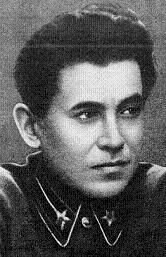 Why hadn't the Russian people revolted against this hellish tyranny? Their failure to do so certainly reinforced a negative image of them in the outside world. One reason is that they had never known anything but autocracy and the secret police were everywhere. Also the costant barrage of propaganda disguising evil as good could make people doubt even their own senses. (As proof of how long that poison lasts, don't we still see elderly Russians waving idealized photos of Stalin and demanding a return of "the good old days?") Those from whom simple folk should have received guidance were totally corrupt. At the height of Yezhov's [right] terror purges in 1938, university officials pledged in Pravda to back Stalin all the way! In 1949 the Russian Orthodox Church, which Stalin had allowed to revive during the war because it stiffened morale, hailed his 70th birthday with a prayer thanking God for "giving us this Stalin, this pillar of social justice."
Why hadn't the Russian people revolted against this hellish tyranny? Their failure to do so certainly reinforced a negative image of them in the outside world. One reason is that they had never known anything but autocracy and the secret police were everywhere. Also the costant barrage of propaganda disguising evil as good could make people doubt even their own senses. (As proof of how long that poison lasts, don't we still see elderly Russians waving idealized photos of Stalin and demanding a return of "the good old days?") Those from whom simple folk should have received guidance were totally corrupt. At the height of Yezhov's [right] terror purges in 1938, university officials pledged in Pravda to back Stalin all the way! In 1949 the Russian Orthodox Church, which Stalin had allowed to revive during the war because it stiffened morale, hailed his 70th birthday with a prayer thanking God for "giving us this Stalin, this pillar of social justice."
Villains and Victims
 It cannot be denied that the ruling elite of the Soviet Union at the time of the Ukrainian Holocaust was largely Jewish. Soviet spymaster Pavel Sudoplatov [right] reports in Special Tasks[5] that when he was transferred from Kharkov to Moscow back in 1933, "Jews held top positions in every major Ministry." Nor can it be denied that in the 1917 October Revolution a popular uprising was virtually hijacked by Jewish Bolsheviks, who then proceeded to impose on the Russian people a ruthlessly atheistic regime which was not at all what the average Russian had in mind. Instead of the democratic "rule from below," which Lenin had promised them, the workers got an iron-fisted dictatorship of one party.
It cannot be denied that the ruling elite of the Soviet Union at the time of the Ukrainian Holocaust was largely Jewish. Soviet spymaster Pavel Sudoplatov [right] reports in Special Tasks[5] that when he was transferred from Kharkov to Moscow back in 1933, "Jews held top positions in every major Ministry." Nor can it be denied that in the 1917 October Revolution a popular uprising was virtually hijacked by Jewish Bolsheviks, who then proceeded to impose on the Russian people a ruthlessly atheistic regime which was not at all what the average Russian had in mind. Instead of the democratic "rule from below," which Lenin had promised them, the workers got an iron-fisted dictatorship of one party.
Yuri Martov and Rafael Albramovich joined Andrei Vyshinsky -- later notorious as Stalin's venemous prosecutor in the Moscow "Show Trials" -- in heading the Menshevik faction soon swallowed up in Lenin's Bolsheviks. Lenin himself (né Ulyanov) was more Tartar than Jewish. His chief organizer was Yakov Smerdlov, who in 1918 sent Jakob Yurovsky, another Jew, to slaughter the Czar and his entire household. Leon Trotsky (né Bronstein) once rivaled Lenin and Stalin for the leadership. Grigori Zinoviev (né Radomyslsky) and Lev Kamenev (né Rozenfeld), together with Stalin, formed the ruling triumvirate upon Lenin's death.
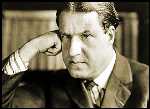 Considerable support for the Bolshevik Revolution was furnished by the American-Jewish community. U.S. Army Intelligence reported in 1918 that of some 300 Jews it identified as "commissars," more than half had come from New York. Financially the Reds' most prominent Amreican backer, though his contribution shrinks in comparison to the 140 million gold marks Lenin received from Berlin, was Jacob Schiff of Kuhn Loeb and Co. Since bankers are not noted for revolutionary fervor, one can only guess at Schiff's motive for funding Lenin with some $20 million. Zionist Rabbi Steven S. Wise [above] left no doubt as to his feeling about the Communist takeover, "Some call it Marxism -- I call it Judaism."
Considerable support for the Bolshevik Revolution was furnished by the American-Jewish community. U.S. Army Intelligence reported in 1918 that of some 300 Jews it identified as "commissars," more than half had come from New York. Financially the Reds' most prominent Amreican backer, though his contribution shrinks in comparison to the 140 million gold marks Lenin received from Berlin, was Jacob Schiff of Kuhn Loeb and Co. Since bankers are not noted for revolutionary fervor, one can only guess at Schiff's motive for funding Lenin with some $20 million. Zionist Rabbi Steven S. Wise [above] left no doubt as to his feeling about the Communist takeover, "Some call it Marxism -- I call it Judaism."
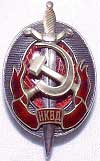
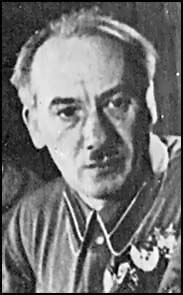 Confounding the rabbi, one of Lenin's first acts was to close all synagogues and ban the study of Hebrew. Most Jewish Bolsheviks had already renounced Judaism, agreeing with Lenin that "even the thought of God is vile." Led by Chief Atheist Yaroslavsky (né Gubelmann), they persecuted all religionists. Soviet archives have recently revealed that some 200,000 priests were murdered, often in the cruelest ways. Stalin, of course, concurred in all of this slaughter. It was only by doing his will that Jews -- or anyone else -- could maintain their place in the leadership. And maintain it they did, despite Stalin's own anti-Semitism. (We need their minds," he explained.) The entire Gulag was run at one time by Mattvei Berman; the NKVD by Genrikh Yagoda [right]. Such people prided themselves on their status in "the new elite." All benefited from Stalin's 1930 decree that "Egalitarianism has no place in Marxist society." When millions of his countrymen were on the brink of starvation, Kamenev was leisurely cruising around Moscow in a Rolls-Royce, perhaps to visit Yagoda in his mansion or the lavish spread of Foreign Minister Maxim Litvinov (né Isser Meir Wallach) or the luxurious Kremlin siteof spin doctor Karl Radek (né Sobelson).
Confounding the rabbi, one of Lenin's first acts was to close all synagogues and ban the study of Hebrew. Most Jewish Bolsheviks had already renounced Judaism, agreeing with Lenin that "even the thought of God is vile." Led by Chief Atheist Yaroslavsky (né Gubelmann), they persecuted all religionists. Soviet archives have recently revealed that some 200,000 priests were murdered, often in the cruelest ways. Stalin, of course, concurred in all of this slaughter. It was only by doing his will that Jews -- or anyone else -- could maintain their place in the leadership. And maintain it they did, despite Stalin's own anti-Semitism. (We need their minds," he explained.) The entire Gulag was run at one time by Mattvei Berman; the NKVD by Genrikh Yagoda [right]. Such people prided themselves on their status in "the new elite." All benefited from Stalin's 1930 decree that "Egalitarianism has no place in Marxist society." When millions of his countrymen were on the brink of starvation, Kamenev was leisurely cruising around Moscow in a Rolls-Royce, perhaps to visit Yagoda in his mansion or the lavish spread of Foreign Minister Maxim Litvinov (né Isser Meir Wallach) or the luxurious Kremlin siteof spin doctor Karl Radek (né Sobelson).
If the Jewish elite prospered, it is also true that many Jewish people suffered greatly under the Soviet system. Despite having backed Stalin all the way, they came to be characterized as "rootless cosmopolitans," whose loyalty lay elsewhere. People of higher culture -- which often meant Jews -- were always a threat to Stalin. Writers, doctors, lawyers, scientists, and teachers -- all who "knew better" and might be tempted to expose the Bolshevik lie -- were prime targets for his paranoia. The poet, Osip Mandelstam, was hounded to a cruel death in the Gulag, and the renowned physicist, Lev Landau, almost killed by his torturers, the same people who strove frantically to keep him alive after a road accident! The celebrated actor, Mikhoels, was brutually murdered for having dared complain to Molotov about cultural repression.
Mandelstam's widow, Nadezhda, writes in Hope Against Hope[6] (p. 202): "People who had voices were subjected to the vilest of tortures; their tongues were torn out, and with the stump that remained they were forced to glorify the tyrant." The famed Anna Akhmatova, whose patriarchal ancestor had rejoiced in the name "Akhmat of the Golden Horde," had to write poems in praise of Stalin because the Gulag held her son hostage. what could happen even to true believers is poignantly described in Suzanne Rosenberg's Soviet Odyssey.[7] Although lifelong Communists, both she and her mother wound up in the Gulag for no better reason than they had once lived in "capitalist" Canada. Suzanne was typical of millions disillusioned by the Bolshevik tyranny but powerless to rise against it. Of the terror years commencing in 1936, she writes (p. 58):
How wrong we all were in thinking that silence and acquiescence would save our skins. It did not. Instead, it created an atmosphere in which it was possible to bring millions to a death all the more cruel because so many of the victims were loyal supporters and dedicated builders of the Soviet system.
Nadezhda seconds this: "We all took the easy way out by keeping silent in the hope that not we but our neighbors would be killed."
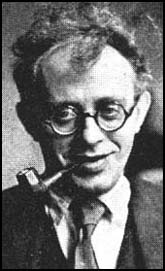 If Jewish people in the Soviet Union suffered, as tens of millions of non-Jews did, it was largely at the hands of the Jewish commissars who ran the Secret Police and the Gulag! How could the same ethnic minority become both the villains and the victims of Bolshevik tyranny? Paul Johnson addresses this in A History of the Jews[8] (pp. 454-55): The outside world "simply assumed that, since the Jews were among the principal instigators of Bolshevism, they must be among its principal beneficiaries." In truth, he says, "only non-Jews held power," meaning those who had renounced their Judaism and were united in their hatred of all religion. If it seems odd that the Jewish Radek [right] should admire a regime already notorious for its anti-Semitism, one has to remember that Bolsheviks commonly renounced all former loyalties, even to their own race. ("Proletarians have no fatherland.") Russianizing their names, they could be as cruel to their own people as to any other. When Stalin taunted his personal secretary with being "a dirty little Yid," the man replied, "I'm not a Jew, I'm a Communist."
If Jewish people in the Soviet Union suffered, as tens of millions of non-Jews did, it was largely at the hands of the Jewish commissars who ran the Secret Police and the Gulag! How could the same ethnic minority become both the villains and the victims of Bolshevik tyranny? Paul Johnson addresses this in A History of the Jews[8] (pp. 454-55): The outside world "simply assumed that, since the Jews were among the principal instigators of Bolshevism, they must be among its principal beneficiaries." In truth, he says, "only non-Jews held power," meaning those who had renounced their Judaism and were united in their hatred of all religion. If it seems odd that the Jewish Radek [right] should admire a regime already notorious for its anti-Semitism, one has to remember that Bolsheviks commonly renounced all former loyalties, even to their own race. ("Proletarians have no fatherland.") Russianizing their names, they could be as cruel to their own people as to any other. When Stalin taunted his personal secretary with being "a dirty little Yid," the man replied, "I'm not a Jew, I'm a Communist."
Kaganovich hated his own origin as the son of a pious tailor in a Ukrainian village often raided by marauding Cossacks. When reproached for abetting his own brother's suicide, he replied, "Stalin is my brother." Asked, "What kind of Jew are you?," he shouted, "Screw the Jews! They do nothing for themselves." Beseeched to save an historic synagogue, he had it turned into a warehouse.
"Kogan," who died in bed a few years ago, was not the first Bolshevik to betray his people. Already in 1921, as part of a drive to abolish "bourgeois morality," Yagoda's deputy, Yakov Agranov, masterminded the execution of 60 Jewish cultural figures, including Akhmatova's first husband. The pattern was repeated in later purges. When Litvinov's deputy was tortured into falsely implicating Soviet ambassadors, the case against them was manufactured by Israel Pinzur. When Komarov tortured academician Goldshtein into ratting on his own colleagues, there was Yakov Braverman writing it all down. When Zinoviev, who in 1918 had so glibly dismissed the lives of 10 million other people who would have to be "annihilated" to enforce the Bolshevik program, was licking the boots of his executioners in a frantic attempt to save his own life, one of them was Stalin's personal barber and NKVD deputy, Karl Pauker, who later re-enacted the horrid scene to Stalin's great amusement.
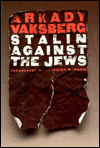 This fratricidal pattern is emphasized in a truthful book by Arkady Vaksberg, Stalin Against The Jews,[9] which illuminates not only the extent of Jewish power, but also how the infinitely cunning Stalin was able again and again to counter it, while preserving the fiction that he himself was not anti-Semitic, by using Jews to destroy other Jews. He had no lack of helpers. The book bristles with the names of sadistic thugs such as Meer Trilisser, the Comintern boss who had earlier distinguished himself as a rival to Yagoda by blowing up Sofia Cathedral with the Bulgarian Czar and his government inside it. Others were Rumin, Rodos, Shvartsman, Raitses and child-torturer Andrei Sverdlov, son of the onetime President. ("The name Sverdlov, both father and son, elicits in decent people only one response -- disgust." The murderous military prosecutor, Naum Rozovsky, went to his death protesting that he hadn't killed enough!
This fratricidal pattern is emphasized in a truthful book by Arkady Vaksberg, Stalin Against The Jews,[9] which illuminates not only the extent of Jewish power, but also how the infinitely cunning Stalin was able again and again to counter it, while preserving the fiction that he himself was not anti-Semitic, by using Jews to destroy other Jews. He had no lack of helpers. The book bristles with the names of sadistic thugs such as Meer Trilisser, the Comintern boss who had earlier distinguished himself as a rival to Yagoda by blowing up Sofia Cathedral with the Bulgarian Czar and his government inside it. Others were Rumin, Rodos, Shvartsman, Raitses and child-torturer Andrei Sverdlov, son of the onetime President. ("The name Sverdlov, both father and son, elicits in decent people only one response -- disgust." The murderous military prosecutor, Naum Rozovsky, went to his death protesting that he hadn't killed enough!
To his credit, Vaksberg does not hesitate to condemn these monsters. Of the Jewish commissars running 11 of the major Gulag complexes, he notes that Stalin could take pleasure "in knowing that the Jewish sadists who served him elicited the disdain and loathing of their millions of slaves" (p. 98).
Where the Offense Is: Given the ghastly outcome of the Russian Revolution, Arkady Vaksberg can scarcely be blamed for trying to counter an impression that it was largely a Jewish creation, an impression, he suggests, "rooted in anti-Semitism." But here we have to ask, Can facts be anti-Semitic? He admits, "Every one of Stalin's serious rivals [in the vicious post-Revolutionary struggle for power] was Jewish" (p. 18). Besides Trotsky, Sverdlov, Kamenev and Zinoviev, they included the clever Sokolnikov and the mysterious Isaiah Goloschekin, who was to become the Butcher of Kazakhstan, just as Bela Kun was to be the scourge of Hungary, and Zalkind of the Crimea. We read, "the abundance of Jewish names in the higher and middle levels of power is indisputable" (p. 22) and, "As fate would have it, the people who surrounded Stalin and rendered him services in the twenties and thirties were mostly Jews" (p. 35).
A large number of Gentiles in Stalin's entourage had Jewish wives, many of whom were political activists in their own right. The fearsome Yezhov, who succeeded Yagoda, had a Jewish spouse -- until he killed her to please Stalin. So did his successor, the monstrous Lavrenti Beria, a Georgian like his boss, who promoted 13 Jews to high positions in his "Gestapo." This illustrates how Jewish power in the Soviet system, even when denied the highest posts, persisted through the interlocking influence of family ties. Could all of these people have been "non-Jews"? Johnson's claim is already weakened by his thesis that the Jewish people were specially created by God to be "a light unto the nations." It is even weaker when we learn that literati such as Pravda boss Lezhnev (né Altschuler), novelists Isaac Babel and Vasilii Grossman, and journalists Ilya Ehrenburg and Mikhail Koltsov were drawn to the GPU like moths to a flame. Babel in particular shocked Grossman by saying, "I have learned to watch calmly as people are executed."
Despite all Stalin's purges, Jewish power had not declined significantly before his death. Kaganovich might then have been the only Jew left in the old hierarchy, but the "vile" Makhlis was still closer to Stalin than anyone else, and much of the bureaucracy was still Jew-run. Jewish power in foreign affairs may have declined since Molotov took over from Litvinov. But then whom had Stalin appointed as the ruthless dictators of his postwar satellites? Rudolf Slansky (né Zaltman) in Czechoslovakia; Matyos Rakoszy in Hungary; Yakup Berman in Poland; Anna Pauker in Romania!
Though its undisputed monarch was a Georgian who secretly hated them, the Soviet Union under Stalin's rule was still quite substantially a "Kingdom of the Red Jews." That was the name given by Jews in medival Europe to the legendary Khazar Empire, which flourished north of the Caucasus (A.D. 650-1050) and whose leaders for political reasons converted to Judaism (circa A.D. 740). From its Mongolian-Jewish population are descended a fair amount of today's Ashkenazim, who constitute the bulk of Western Jewry. (Even today, Russians resenting Jewish influence in their country will refer to it as "the Khazar Khanate.")
In any case, Soviet Jews were never more powerful than at the time of the Terror Famine. Their dominant part in carrying it out, and in the cover-up led by Radek and Litvinov, cannot be denied. Their attitude was summed up in the cruel comment of Politburo member Mendel Khatayevich, who had sent 50,000 "loyal" urban Communists into the countryside to strip every scrap of food from starving villagers. When it was all over, he said, "It took a famine to show them who's master here."
If Germans are blamed for the Nazi Holocaust, why shouldn't Jews be blamed for being in charge of the Ukrainian Holocaust, which killed 7 or 8 million? As the King said to Hamlet before the play within the play, "Where the offense is, let the great axe fall."
PETER LORDEN
____________________________
Notes
1. Stalin's Secret War, Nikolai Tolstoy (Jonathan Cape, London, 1981).
2. The Gulag Archipelago, 1918-1956, Aleksandr Solzhenitsyn (One-volume edition, Harper and Row, N.Y., 1985).
3. White Nights -- The Story of a Prisoner in Russia, Menahem Begin (Harper and Row, N.Y., 1977).
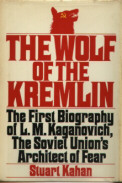 4. The Wolf of the Kremlin, Stuart Kahan (William Morrow, N.Y., 1987).
4. The Wolf of the Kremlin, Stuart Kahan (William Morrow, N.Y., 1987).
5. Special Tasks -- The Memoirs of an Unwanted Witness -- A Soviet Spymaster, Pavel and Anatoli Sudoplatov with Gerrold and Leona Schechter (Little, Brown, 1994).
6. Hope Against Hope, Nadezhda Mandelstam (Atheneum, N.Y., 1970).
7. Soviet Odyssey, Suzanne Rosenberg (Oxford University Press, Toronto, 1988).
8. A History of the Jews, Paul Johnson (Weidenfeld and Nicholson, London, 1987).
9. Stalin Against the Jews, Arkady Vaksberg (Alfred A. Knopf, N.Y., 1994)
|
 Why was the International Red Cross allowed access to Hitler's camps throughout the war, but never to Stalin's? As to Begin's suggestion that the former offered only a quick death and the latter maybe a slow one, Germany has paid compensation to over 4 million Holocaust survivors, most of them Jewish. Gulag survivors got nothing but a criminal record. Begin's prejudice, however, is evident in his failure, when listing Stalin's chief accomplices, to make any mention of Lazar Kaganovich [right], the most powerful Jew in the Soviet Union. His story is told by Stuart Kahan in The Wolf of the Kremlin.[4] For many years second only to Stalin, he was a clever organizer of titanic energy who was widely held responsible for 20 million deaths.
Why was the International Red Cross allowed access to Hitler's camps throughout the war, but never to Stalin's? As to Begin's suggestion that the former offered only a quick death and the latter maybe a slow one, Germany has paid compensation to over 4 million Holocaust survivors, most of them Jewish. Gulag survivors got nothing but a criminal record. Begin's prejudice, however, is evident in his failure, when listing Stalin's chief accomplices, to make any mention of Lazar Kaganovich [right], the most powerful Jew in the Soviet Union. His story is told by Stuart Kahan in The Wolf of the Kremlin.[4] For many years second only to Stalin, he was a clever organizer of titanic energy who was widely held responsible for 20 million deaths. Why hadn't the Russian people revolted against this hellish tyranny? Their failure to do so certainly reinforced a negative image of them in the outside world. One reason is that they had never known anything but autocracy and the secret police were everywhere. Also the costant barrage of propaganda disguising evil as good could make people doubt even their own senses. (As proof of how long that poison lasts, don't we still see elderly Russians waving idealized photos of Stalin and demanding a return of "the good old days?") Those from whom simple folk should have received guidance were totally corrupt. At the height of Yezhov's [right] terror purges in 1938, university officials pledged in Pravda to back Stalin all the way! In 1949 the Russian Orthodox Church, which Stalin had allowed to revive during the war because it stiffened morale, hailed his 70th birthday with a prayer thanking God for "giving us this Stalin, this pillar of social justice."
Why hadn't the Russian people revolted against this hellish tyranny? Their failure to do so certainly reinforced a negative image of them in the outside world. One reason is that they had never known anything but autocracy and the secret police were everywhere. Also the costant barrage of propaganda disguising evil as good could make people doubt even their own senses. (As proof of how long that poison lasts, don't we still see elderly Russians waving idealized photos of Stalin and demanding a return of "the good old days?") Those from whom simple folk should have received guidance were totally corrupt. At the height of Yezhov's [right] terror purges in 1938, university officials pledged in Pravda to back Stalin all the way! In 1949 the Russian Orthodox Church, which Stalin had allowed to revive during the war because it stiffened morale, hailed his 70th birthday with a prayer thanking God for "giving us this Stalin, this pillar of social justice."  It cannot be denied that the ruling elite of the Soviet Union at the time of the Ukrainian Holocaust was largely Jewish. Soviet spymaster Pavel Sudoplatov [right] reports in Special Tasks[5] that when he was transferred from Kharkov to Moscow back in 1933, "Jews held top positions in every major Ministry." Nor can it be denied that in the 1917 October Revolution a popular uprising was virtually hijacked by Jewish Bolsheviks, who then proceeded to impose on the Russian people a ruthlessly atheistic regime which was not at all what the average Russian had in mind. Instead of the democratic "rule from below," which Lenin had promised them, the workers got an iron-fisted dictatorship of one party.
It cannot be denied that the ruling elite of the Soviet Union at the time of the Ukrainian Holocaust was largely Jewish. Soviet spymaster Pavel Sudoplatov [right] reports in Special Tasks[5] that when he was transferred from Kharkov to Moscow back in 1933, "Jews held top positions in every major Ministry." Nor can it be denied that in the 1917 October Revolution a popular uprising was virtually hijacked by Jewish Bolsheviks, who then proceeded to impose on the Russian people a ruthlessly atheistic regime which was not at all what the average Russian had in mind. Instead of the democratic "rule from below," which Lenin had promised them, the workers got an iron-fisted dictatorship of one party. Considerable support for the Bolshevik Revolution was furnished by the American-Jewish community. U.S. Army Intelligence reported in 1918 that of some 300 Jews it identified as "commissars," more than half had come from New York. Financially the Reds' most prominent Amreican backer, though his contribution shrinks in comparison to the 140 million gold marks Lenin received from Berlin, was Jacob Schiff of Kuhn Loeb and Co. Since bankers are not noted for revolutionary fervor, one can only guess at Schiff's motive for funding Lenin with some $20 million. Zionist Rabbi Steven S. Wise [above] left no doubt as to his feeling about the Communist takeover, "Some call it Marxism -- I call it Judaism."
Considerable support for the Bolshevik Revolution was furnished by the American-Jewish community. U.S. Army Intelligence reported in 1918 that of some 300 Jews it identified as "commissars," more than half had come from New York. Financially the Reds' most prominent Amreican backer, though his contribution shrinks in comparison to the 140 million gold marks Lenin received from Berlin, was Jacob Schiff of Kuhn Loeb and Co. Since bankers are not noted for revolutionary fervor, one can only guess at Schiff's motive for funding Lenin with some $20 million. Zionist Rabbi Steven S. Wise [above] left no doubt as to his feeling about the Communist takeover, "Some call it Marxism -- I call it Judaism."
 Confounding the rabbi, one of Lenin's first acts was to close all synagogues and ban the study of Hebrew. Most Jewish Bolsheviks had already renounced Judaism, agreeing with Lenin that "even the thought of God is vile." Led by Chief Atheist Yaroslavsky (né Gubelmann), they persecuted all religionists. Soviet archives have recently revealed that some 200,000 priests were murdered, often in the cruelest ways. Stalin, of course, concurred in all of this slaughter. It was only by doing his will that Jews -- or anyone else -- could maintain their place in the leadership. And maintain it they did, despite Stalin's own anti-Semitism. (We need their minds," he explained.) The entire Gulag was run at one time by Mattvei Berman; the NKVD by Genrikh Yagoda [right]. Such people prided themselves on their status in "the new elite." All benefited from Stalin's 1930 decree that "Egalitarianism has no place in Marxist society." When millions of his countrymen were on the brink of starvation, Kamenev was leisurely cruising around Moscow in a Rolls-Royce, perhaps to visit Yagoda in his mansion or the lavish spread of Foreign Minister Maxim Litvinov (né Isser Meir Wallach) or the luxurious Kremlin siteof spin doctor Karl Radek (né Sobelson).
Confounding the rabbi, one of Lenin's first acts was to close all synagogues and ban the study of Hebrew. Most Jewish Bolsheviks had already renounced Judaism, agreeing with Lenin that "even the thought of God is vile." Led by Chief Atheist Yaroslavsky (né Gubelmann), they persecuted all religionists. Soviet archives have recently revealed that some 200,000 priests were murdered, often in the cruelest ways. Stalin, of course, concurred in all of this slaughter. It was only by doing his will that Jews -- or anyone else -- could maintain their place in the leadership. And maintain it they did, despite Stalin's own anti-Semitism. (We need their minds," he explained.) The entire Gulag was run at one time by Mattvei Berman; the NKVD by Genrikh Yagoda [right]. Such people prided themselves on their status in "the new elite." All benefited from Stalin's 1930 decree that "Egalitarianism has no place in Marxist society." When millions of his countrymen were on the brink of starvation, Kamenev was leisurely cruising around Moscow in a Rolls-Royce, perhaps to visit Yagoda in his mansion or the lavish spread of Foreign Minister Maxim Litvinov (né Isser Meir Wallach) or the luxurious Kremlin siteof spin doctor Karl Radek (né Sobelson). If Jewish people in the Soviet Union suffered, as tens of millions of non-Jews did, it was largely at the hands of the Jewish commissars who ran the Secret Police and the Gulag! How could the same ethnic minority become both the villains and the victims of Bolshevik tyranny? Paul Johnson addresses this in A History of the Jews[8] (pp. 454-55): The outside world "simply assumed that, since the Jews were among the principal instigators of Bolshevism, they must be among its principal beneficiaries." In truth, he says, "only non-Jews held power," meaning those who had renounced their Judaism and were united in their hatred of all religion. If it seems odd that the Jewish Radek [right] should admire a regime already notorious for its anti-Semitism, one has to remember that Bolsheviks commonly renounced all former loyalties, even to their own race. ("Proletarians have no fatherland.") Russianizing their names, they could be as cruel to their own people as to any other. When Stalin taunted his personal secretary with being "a dirty little Yid," the man replied, "I'm not a Jew, I'm a Communist."
If Jewish people in the Soviet Union suffered, as tens of millions of non-Jews did, it was largely at the hands of the Jewish commissars who ran the Secret Police and the Gulag! How could the same ethnic minority become both the villains and the victims of Bolshevik tyranny? Paul Johnson addresses this in A History of the Jews[8] (pp. 454-55): The outside world "simply assumed that, since the Jews were among the principal instigators of Bolshevism, they must be among its principal beneficiaries." In truth, he says, "only non-Jews held power," meaning those who had renounced their Judaism and were united in their hatred of all religion. If it seems odd that the Jewish Radek [right] should admire a regime already notorious for its anti-Semitism, one has to remember that Bolsheviks commonly renounced all former loyalties, even to their own race. ("Proletarians have no fatherland.") Russianizing their names, they could be as cruel to their own people as to any other. When Stalin taunted his personal secretary with being "a dirty little Yid," the man replied, "I'm not a Jew, I'm a Communist." This fratricidal pattern is emphasized in a truthful book by Arkady Vaksberg, Stalin Against The Jews,[9] which illuminates not only the extent of Jewish power, but also how the infinitely cunning Stalin was able again and again to counter it, while preserving the fiction that he himself was not anti-Semitic, by using Jews to destroy other Jews. He had no lack of helpers. The book bristles with the names of sadistic thugs such as Meer Trilisser, the Comintern boss who had earlier distinguished himself as a rival to Yagoda by blowing up Sofia Cathedral with the Bulgarian Czar and his government inside it. Others were Rumin, Rodos, Shvartsman, Raitses and child-torturer Andrei Sverdlov, son of the onetime President. ("The name Sverdlov, both father and son, elicits in decent people only one response -- disgust." The murderous military prosecutor, Naum Rozovsky, went to his death protesting that he hadn't killed enough!
This fratricidal pattern is emphasized in a truthful book by Arkady Vaksberg, Stalin Against The Jews,[9] which illuminates not only the extent of Jewish power, but also how the infinitely cunning Stalin was able again and again to counter it, while preserving the fiction that he himself was not anti-Semitic, by using Jews to destroy other Jews. He had no lack of helpers. The book bristles with the names of sadistic thugs such as Meer Trilisser, the Comintern boss who had earlier distinguished himself as a rival to Yagoda by blowing up Sofia Cathedral with the Bulgarian Czar and his government inside it. Others were Rumin, Rodos, Shvartsman, Raitses and child-torturer Andrei Sverdlov, son of the onetime President. ("The name Sverdlov, both father and son, elicits in decent people only one response -- disgust." The murderous military prosecutor, Naum Rozovsky, went to his death protesting that he hadn't killed enough! 4. The Wolf of the Kremlin, Stuart Kahan (William Morrow, N.Y., 1987).
4. The Wolf of the Kremlin, Stuart Kahan (William Morrow, N.Y., 1987).